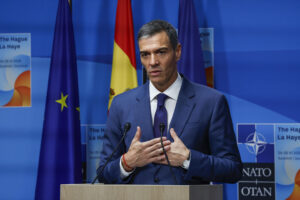The organization of the North Atlantic Treaty (NATO) approved on Wednesday (25) the new goal for all member countries to invest 5% of Gross Domestic Product (GDP) in defense. The agreement, closed during the Aliança Summit in The Hague, the Netherlands, increases the pressure on nations that still resist the increase in military spending, such as Spain.
Since resumed the US presidency in January, Donald Trump has been publicly charging all NATO allies to increase their defense investments. The refusal of the Spanish government, led by socialist prime minister Pedro Sánchez, to join the new goal transformed the country into the main target of American pressure.
In conversation with reporters at Air Force One, on his way to the NATO summit in The Hague, on Tuesday (24), Trump directly criticized the stance of the socialist government of Spain.
“There is a problem with Spain. There is always a problem with Spain. Spain is not in agreement (with the goal). Which is very unfair to the rest,” he said.
The United States’s concern with the Spanish is based on OTAN official numbers. In 2024, Spain, under the command of the socialist government, was the country that least invested in defense in the bloc, with only 1.28% of GDP intended for the sector – an index well below the 2% combined in the summit of 2014 and 5% and the 5% now established for the next decade. While Poland (4.1% of GDP), Estonia (3.43% of GDP) and the United States themselves (3.38% of GDP) already invest above the average proposed in 2014 – and almost close to the new goal, Spain was even from neighbors such as Portugal (1.55%) and Belgium (1.30%).
Sánchez government tries to make commitment more flexible
Despite signed this Wednesday’s joint statement on the new goal, the Spanish socialist government indicated that, in practice, it intends to limit its commitment to defense investment to 2.1% of GDP, considering moving to 3.5% only in a future scenario provided for in internal planning.
Pedro Sánchez claims that raising spending to 5% of GDP would endanger the “welfare state of the country”. According to the prime minister, to reach the new goal by 2035 would need an additional expenditure of about 350 billion euros, which, according to Sánchez, would only be possible with tax increases, cuts in social benefits and reduction of investments in areas such as education and pensions. ”
Widespread corruption weaken socialist government discourse
Sánchez’s argument to restrict defense investments contrasts with the series of corruption scandals involving their families and government allies.
Since 2024, the premie’s wife, Begoña Gómez, is being investigated under suspicion of influence trafficking and corruption in contracts with universities and private companies. Investigations point out that she would have benefited from her husband’s position to get favor in academic projects and raise resources from private entities.
Sánchez’s brother David Sánchez also responds to a lawsuit for influence trafficking and prevarication after being hired for a public office in the city of Badajoz on suspicion of irregularities in the selection process, which would have been created only to benefit him.
The Spanish Workers Socialist Party (PSOE), led by Sánchez, is also at the Center for Corruption Investigations. The main scandal is the so-called “Kold case”, which investigates fraud and diversion of money in public contracts to provide masks during the Covid-19 pandemic. The case involves the party’s weight names, such as former Transport Minister José Luis Albalos, and former PSOE Secretary of Organization, Santos Cerdán, both cited in telephone interceptions and targets of police investigations.
Even Spain Attorney General Álvaro García Ortiz is investigated for alleged leakage of information to favor PSOE allies involved in allegations of corruption.
Opposition says that Sánchez uses case with NATO as a “smoke curtain”
Although Sánchez is not yet a direct target of allegations of corruption, the involvement of family members and allies feeds the perception of hypocrisy in the discourse on public resources.
The Centro-Right Popular Party (PP), the main opposition force, accuses the socialist government of instrumentalizing the debate about NATO’s defense goal as a “smoke curtain” to divert the focus from corruption scandals involving the PSO core.
In sessions in Parliament, PP deputies have also highlighted the contradiction between the argument of the lack of defense funds and the millions allegedly diverted in public contracts during the pandemic. They also charge the resignation of Sánchez and nearby ministers.
“He (Pedro Sánchez) should not return (from the NATO summit) as president of the Spanish government,” said PP leader Alberto Nuñez Feijóo.
Trump promises to retaliate Madrid
After NATO’s summit, Trump classified Spanish posture as the most hostile within the covenant.
“I think Spain is terrible. It’s the only country that won’t pay the full amount. They want to be 2%. I think it’s terrible. And, as you know, they are doing very well. The economy is going very well. And this economy can collapse if something bad happens,” he said.
The US President also said he intends to directly negotiate a new trade agreement with Madrid and promised to penalize the country for the lack of military commitment.
“I will negotiate directly with Spain. I will do this myself. They will pay. So they will pay more,” he said. “We will negotiate a business agreement with Spain. We will make them pay double. And I am serious. We will make it,” he said, even acknowledging that Spain is part of the European Union collective agreements.











